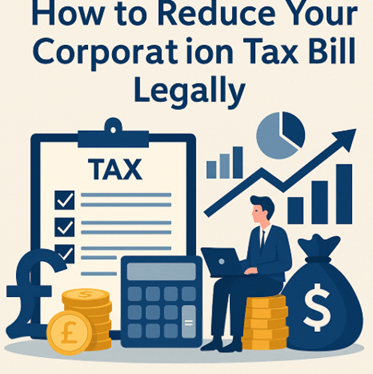-
News
-
Blog
-
Archive

Corporation tax can be one of the largest expenses for UK companies, especially for small and medium-sized enterprises (SMEs). While paying tax is a legal obligation, there are legitimate and effective ways to reduce your bill without falling foul of HMRC rules. With the guidance of experienced accountants in Bolton and Manchester, you can take advantage of reliefs, allowances, and strategic planning to optimise your tax position.
1. Claim All Allowable Business Expenses
The foundation of reducing your corporation tax liability is to ensure all allowable business expenses are claimed. This includes costs for:
- Office rent and utilities
- Business travel and subsistence
- Professional fees (e.g., legal and accounting)
- Marketing and advertising
- Staff salaries and benefits
A professional accountant can help identify often-missed expenses, ensuring you claim everything HMRC permits.
2. Take Advantage of Capital Allowances
Capital allowances allow you to deduct the cost of qualifying assets from your profits. Assets such as machinery, office furniture, and IT equipment may qualify for the Annual Investment Allowance (AIA), giving you 100% relief in the year of purchase. Enhanced Capital Allowances for energy-efficient equipment can also provide significant savings.
3. Utilise Research and Development (R&D) Tax Credits
If your business is innovating—whether developing new products, processes, or improving existing systems—you may qualify for R&D tax credits. SMEs can claim up to 33p for every £1 spent on qualifying activities. Many companies underestimate their eligibility, so it's worth consulting accountants in Bolton and Manchester to review your projects.
4. Optimise Salary and Dividend Mix for Directors
Paying yourself as a company director through a combination of salary and dividends can minimise both corporation and personal tax liabilities. The right balance will depend on your income, allowances, and company profits.
5. Claim Relief on Pension Contributions
Employer pension contributions are tax-deductible and reduce the company's taxable profits. This also helps directors save for retirement in a tax-efficient way.
6. Offset Losses Against Profits
If your company has made a loss in previous years, these can often be carried forward or carried back to offset profits, reducing your tax bill.
7. Consider Timing of Income and Expenditure
Strategically timing when income is invoiced or expenses are paid can help reduce taxable profits each year, improving cash flow and reducing your immediate tax liability.
8. Charitable Donations
Donations to registered charities are deductible against profits, offering a win-win—supporting good causes while reducing your tax bill.
Conclusion
Reducing your corporation tax bill is about careful planning, accurate record-keeping, and taking full advantage of legal reliefs and allowances. By working with experienced accountants in Bolton and Manchester, you can ensure compliance while keeping more of your hard-earned profits.